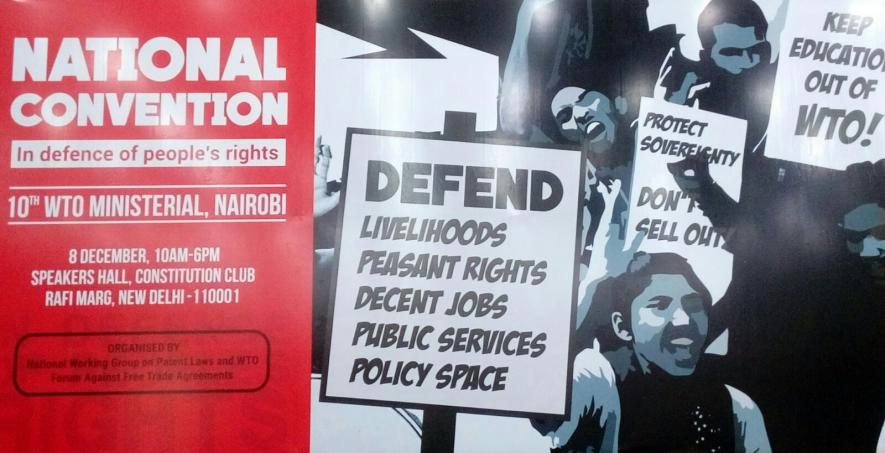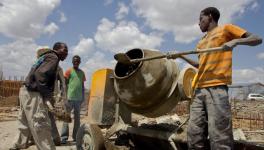Civil Society calls for Defence of Peoples Rights at WTO Nairobi Ministerial.
DECLARATION
In Defence of People's Rights at 10th Ministerial Conference in Nairobi
New Delhi, 8 December 2015
Twenty years ago, developing countries signed onto the World Trade Organisation (WTO) with the promise of raising standards of living, ensuring full employment, food security, technological advancement and achieving sustainable development. In 2015, it is evident that WTO’s trade and investment rules have taken the developing world in the opposite direction. The WTO has served as a powerful tool in the hands of the North to undermine sovereign development trajectories in the South.
The Tenth Ministerial Conference to be held in Nairobi, Kenya, from 15-18 December 2015 is again heading towards strengthening of the hands of the North at the WTO. There is a concerted push by developed countries such as USA and EU to further this fundamentally flawed, pro-corporate capital and anti democratic process of “free” trade and investment “liberalisation”. Issues that were earlier rejected in the Singapore Ministerial (1996) such as Investment, Government Procurement and Competition Policy are being brought back. Further, the so called ‘21st century issues’ such as E-Commerce, Environmental Goods and Global Value Chains are now on the table with the sole purpose of eliminating autonomous policy space of the South. Several of these issues are already present in the US led Trans Pacific Partnership (TPP) which has recently been concluded. These need to be rejected firmly by India.
In this context we are concerned that India is open to discussing new issues, as has been reflected in the Commerce Ministers recent statement. On the contrary India should unify developing countries in order to regain lost national policy space and highlight long standing issues of concern such as food security, special and differential treatment, reduction of agribusiness subsidies in developed countries and review of TRIPS, many of which find mention in the Doha Development Agenda (DDA) of WTO. Rather than being trapped in the agenda of the developed countries to aggressively pry open developing country markets, India should push for reinforcing the development mandate in any trade discussion. In the eventuality of India being unable to extract concrete concessions from the developed countries on these issues and the latter’s insertion of new agendas at Nairobi; we call upon the Government of India to walk out of the Ministerial Conference.
Provision of food, education, health and guarantee of decent jobs are essential elements for the realisation of the fundamental rights granted by the Indian Constitution. These are the issues under threat at the WTO. In the name of “market distortions”, minimum support price (MSP) for public stockholding of food grains, state support for health and education are sought to be withdrawn.At a time when neo-liberal economic policies have not only deepened the agrarian crisis in rural India, but also led to a breakdown of public services, resulted in complete de-industrialisation in some sectors and technological dependence in others forcing India on to the low value added path in the global supply chain resulting in loss of millions of jobs in manufacturing, especially in small medium and village enterprises, any further concessions at the WTO will lead to further impoverishment for the working classes, peasants, indigenous peoples, artisans, women, dalits and other marginalised sections of the Indian population.
We, the undersigned note with grave concern that so far the Government of India has not discussed in the Indian Parliament these disturbing developments at the WTO. We underline that no commitments should be made before due debate and ratification by the Indian Parliament and public consultation. Further, as trade issues have intruded on policy spaces under the purview of state governments, approvals from state legislatures and relevant local bodies should also be made mandatory. Given the deep democratic deficit in WTO processes, we call for a moratorium on any new commitments. In this context, we also demand that conditional GATS offers that were made by India in critical sectors such as higher education, health, finance and insurance be immediately withdrawn.
We call on the Indian Parliament to debate and vote, based on robust evidence of the employment, livelihood, social and environmental impacts of 20 years of the WTO Agreements, various free trade agreements (FTAs) and autonomous liberalisation. This process must be preceded by decisions of state legislative assemblies and should also be informed by inputs from academia, public intellectuals, trade unions, social movements and non-governmental organisations.
Based on this evidence, the Government of India should roll back harmful commitments that were made under the Agreement on Agriculture (AoA), the Agreement on Trade-Related Investment Measures (TRIMs), Agreement on Trade Related Aspects of Intellectual Property Rights (TRIPS), General Agreement on Trade in Services (GATS) and other WTO agreements.
Twenty years on, we demand that the Government of India thoroughly reorient its stand in international trade and investment negotiations and align it truly with the pro-people agenda of self-reliant and sustainable development. We also call upon the Government of India to work towards such a progressive and alternate agenda in solidarity and cooperation with likeminded countries of the South.
With this end in view, the signatories to this declaration commit to taking this message across the country through campaigns, rallies and conventions. We call upon mass organisations from across the country to join this process of defending democracy, reclaiming self-reliance and sovereignty.
Endorsed by:
Eighty one organisations, including leading Trade unions, Adivasis, Dalit, Kisan sabhas, Students, Women and other organisations.

Get the latest reports & analysis with people's perspective on Protests, movements & deep analytical videos, discussions of the current affairs in your Telegram app. Subscribe to NewsClick's Telegram channel & get Real-Time updates on stories, as they get published on our website.
























